Recent years have seen an amazing rise in e-commerce on a worldwide scale, an unheard-of expansion that has left a permanent imprint. With the development of digital technology, online shopping has seen an exponential rise in popularity that shows no signs of slowing down. The need for skilled e-commerce developers has thus never been greater, prompting an examination of the fundamental competencies that these developers must possess in the constantly changing field of online trade. We’ll set out on an exploration inside the constraints of this article to discover the top five skills that e-commerce developers must possess in order to keep advantage and succeed in the rapidly changing world of online business. So let’s delve into the dark and set off on a revealing journey into the world of trade!
The Rise of E-commerce
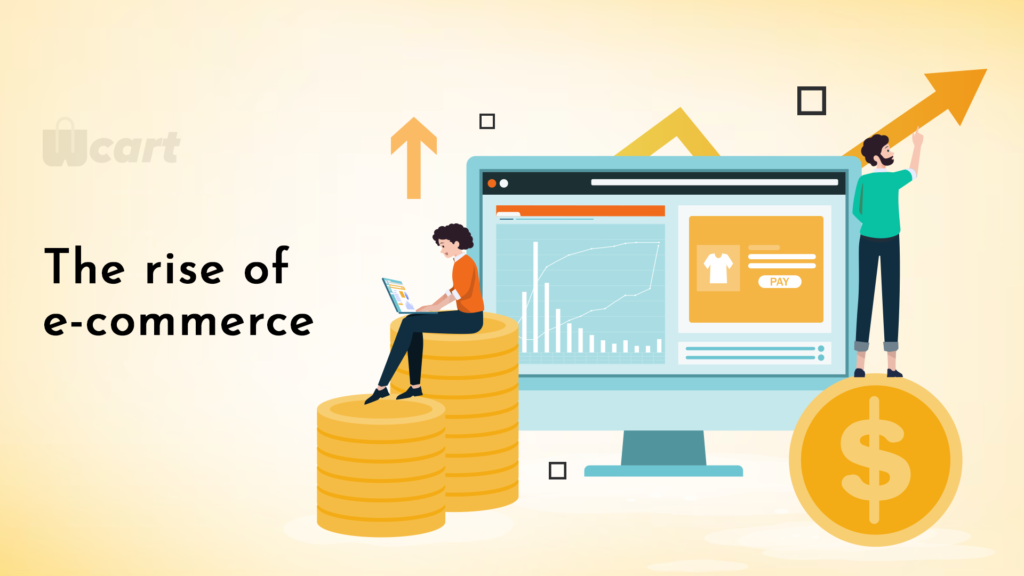
In the past decade, the realm of e-commerce has witnessed a staggering surge, emerging as a prominent force in the global economy. The convenience bestowed by online shopping and the escalating integration of digital technology have propelled the e-commerce sector to unprecedented heights. Surpassing the $4 trillion mark in 2020, the worldwide e-commerce market is predicted to surge beyond $6 trillion by 2024. However, this surge bestows substantial prospects upon businesses of all scales, facilitating their entry into untapped markets and amplifying their revenue streams.
The developers assume a pivotal role in crafting, constructing, and upholding e-commerce platforms that exude efficiency, fortitude, and user-friendliness. The repertoire of skills required by these developers encompasses expertise in programming languages, responsive web design, security, mobile development, and UX/UI design. By leveraging their acumen and proficiency, e-commerce developers possess the power to shape the trajectory of commerce, empowering businesses to flourish within the digital landscape
Read More: For Understanding about What is Ecommerce?
Importance of E-commerce Developers
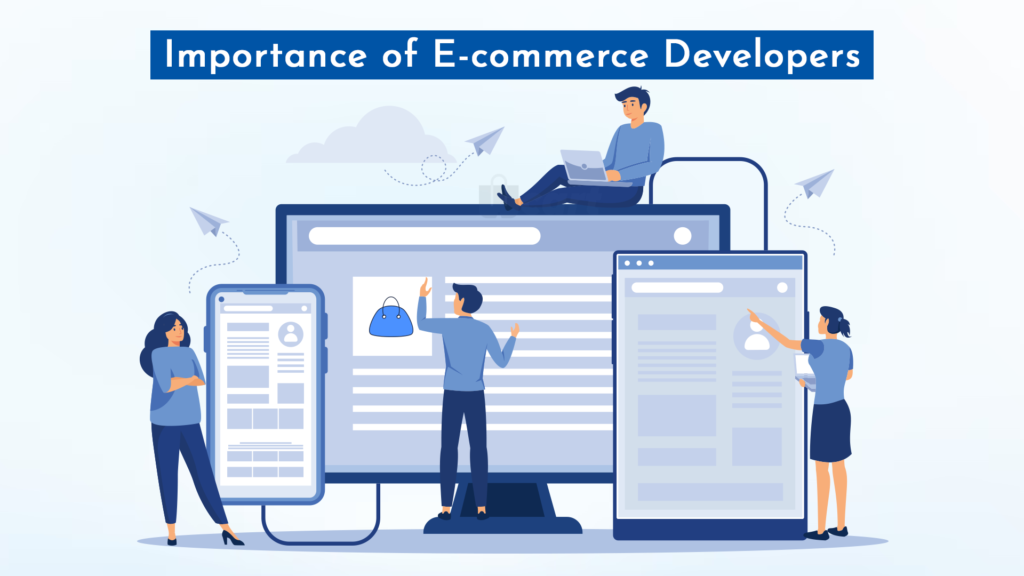
E-commerce developers hold immense significance in driving the triumph of online enterprises. Their role encompasses constructing and upholding e-commerce platforms that are not only efficient and secure but also user-friendly. Here are several compelling reasons highlighting the paramount importance of these professionals:
- Crafting responsive web design: Accomplished developers proficient in responsive web design play a pivotal role in optimizing websites for diverse devices, facilitating hassle-free product browsing and purchases. By meticulously designing e-commerce platforms that seamlessly function across multiple devices and screen sizes, these developers ensure that websites swiftly adapt to various screen resolutions. This, in turn, offers customers an intuitive and gratifying user experience.
- Developing mobile applications: The popularity of mobile apps is on a relentless ascent in the e-commerce sector. E-commerce developers well-versed in constructing mobile apps for both iOS and Android platforms aid businesses in expanding their customer reach and providing a streamlined shopping experience. By capitalizing on the vast mobile user base, businesses can augment their online presence and forge deeper connections with their clientele.
- Creating user-friendly interfaces: Seamless usability and navigation are crucial aspects of e-commerce platforms. E-commerce developers proficient in UX/UI design possess the capability to fashion interfaces that are inherently user-friendly and intuitive, elevating the overall customer experience. By prioritizing ease of use and accessibility, these developers contribute to heightened customer satisfaction and bolstered brand loyalty.
In conclusion, the involvement of e-commerce developers assumes a mission-critical role in the triumph of any online business. Their indispensable skills and expertise are pivotal in the construction and sustenance of e-commerce platforms that epitomize efficiency, security, and user-friendliness. Therefore, it is imperative for businesses to make substantial investments in recruiting and training proficient e-commerce developers to not only outpace the competition but also thrive in the fast-paced
Example for choosing Wcart Platform E-commerce Developers
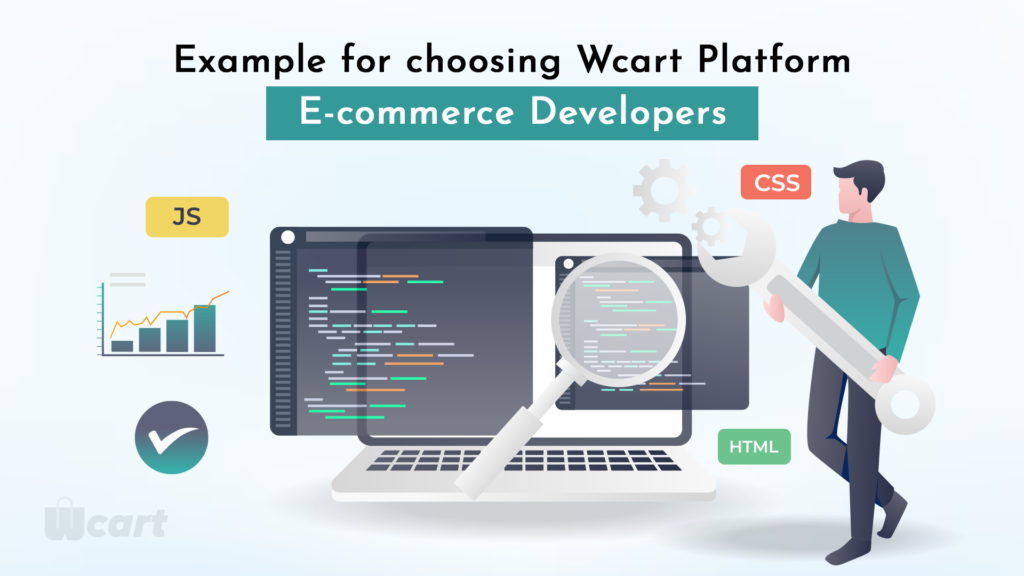
Consider the scenario where a small business owner aspires to establish an online store for marketing their diverse range of products. To accomplish this goal, they opt for the Wcart e-commerce platform due to its commendable user-friendly interface and customizable attributes. However, business owner encounters a predicament as they lack proficiency in web development and the intricacies of e-commerce. This is precisely when the expertise of an e-commerce developer becomes invaluable, as they are able to provide essential insights, suggestions, and guidance.
The role of the e-commerce developer extends beyond mere guidance; they possess the capability to assist the business owner in setting up the online store on the Wcart platform. This encompasses tailoring the website’s design and functionality to align precisely with the unique requirements of the business owner. Furthermore, they undertake the responsibility of optimizing the website for search engines, incorporating robust security measures to safeguard customer data, and seamlessly integrating payment gateways to facilitate convenient online transactions.
Moreover, the e-commerce developer assumes the crucial responsibility of ensuring the continual maintenance and timely updates of the website. This encompasses guaranteeing that the website remains up-to-date and impervious to potential security vulnerabilities. Furthermore, they provide comprehensive training and support to the business owner, empowering them to proficiently manage the website, introduce new products, and efficiently fulfill customer orders.
In essence, the e-commerce developer assumes a pivotal role in enabling the small business owner to successfully launch and operate their online store on the Wcart platform. Through their technical expertise and wealth of experience, they create a captivating e-commerce website that possesses the necessary attributes to effectively compete within the dynamic digital marketplace.
Overview of the 5 E-commerce Developer’s Skills
whereas let’s see the 5 skills needed for ecommerce developers
1. Proficiency in Programming Languages
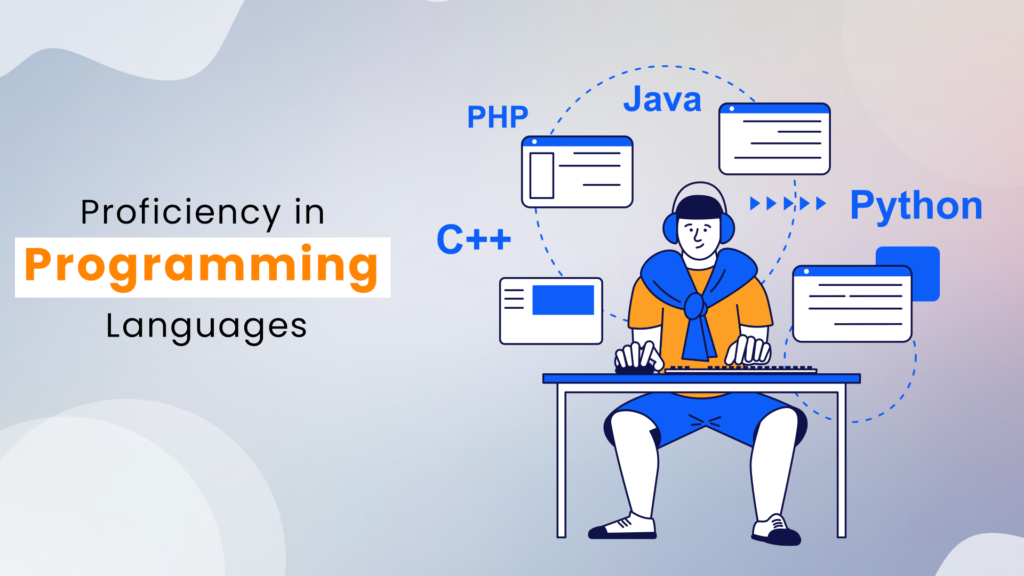
When it comes to e-commerce development, a diverse set of programming languages can empower developers to create robust and captivating online experiences. Let’s explore some essential programming languages that every e-commerce developer should master:
- JavaScript: A ubiquitous language in the web development realm, JavaScript reigns supreme when it comes to building interactive and dynamic web applications. E-commerce developers must possess a profound understanding of JavaScript as it forms the backbone of front-end development in e-commerce websites, enabling seamless user interactions and engaging visual elements.
- Node.js: As an ingenious JavaScript runtime environment, Node.js revolutionizes server-side programming. E-commerce platforms, such as the formidable Wcart, extensively utilize Node.js to construct highly scalable and lightning-fast server-side applications.
- HTML: The bedrock of the web, Hypertext Markup Language (HTML) bestows structure and content on web pages. In the dynamic realm of the Wcart e-commerce platform, HTML plays a pivotal role in crafting captivating layouts and compelling content for a wide array of web pages. From product listings to category pages and checkout processes, e-commerce developers harness HTML’s expressive power to orchestrate an immersive shopping experience.
- React.js: Developed by the tech behemoth Facebook, React.js has emerged as a go-to JavaScript library for creating awe-inspiring user interfaces in web applications. Its ingenious component-based architecture empowers developers to construct reusable UI elements, facilitating the development of intricate and dynamic e-commerce applications.
- SQL: In the realm of data management, Structured Query Language (SQL) reigns supreme. E-commerce developers should master SQL’s intricacies as it serves as the linchpin for handling databases. From storing and managing product information to handling customer data and order details, SQL forms the foundation for efficient and secure e-commerce platforms.
Overall with this diverse skill set, they can construct and maintain efficient, secure, and captivating e-commerce platforms that deliver unparalleled user experiences.
2. Responsive Web Design
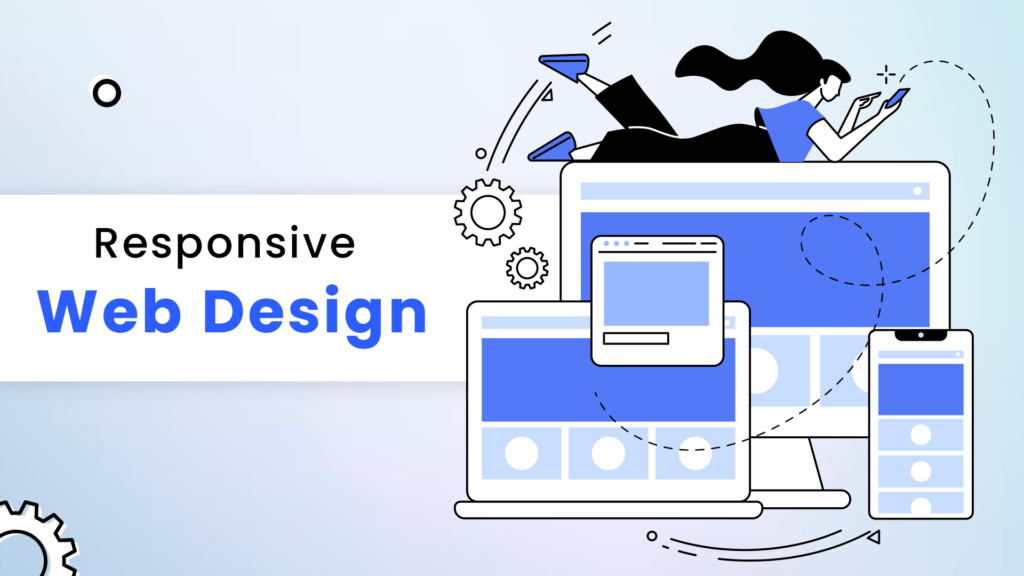
Responsive web design plays a pivotal role in the development of e-commerce. It involves crafting a website that seamlessly adapts to diverse screen sizes and devices, encompassing smartphones, tablets, and desktop computers. Below, we delve into vital aspects to consider when implementing responsive web design for e-commerce:
- Embrace a mobile-first approach: Given that over half of e-commerce traffic originates from mobile devices, prioritize designing for smaller screens first. Subsequently, expand and tailor the website for larger screens accordingly.
- Employ flexible layouts: Emphasize the use of adaptable layouts capable of accommodating varied screen sizes and resolutions. Fluid grids, adjustable font sizes, and flexible images prove invaluable in this pursuit.
- Foster device-agnostic design: Strive to create a seamless user experience across all devices, irrespective of their screen size, operating system, or browser. Designing for all devices, rather than specific ones, ensures inclusivity.
- Optimize performance: Optimize the website’s performance for mobile devices, as sluggish loading times can lead to higher bounce rates and diminished conversion rates. Optimization measures include image optimization, file compression, and minimizing the number of HTTP requests.
- Test and optimize continuously: Regularly subject the website to comprehensive testing across diverse devices and screen sizes. This ensures proper functionality and upholds a high-quality user experience. Additionally, leverage user feedback and analytics data to continually optimize the website.
E-commerce developers must adopt a mobile-first approach, implement flexible layouts, foster device-agnostic design, optimize performance, and consistently test and optimize the website to deliver an impeccable user experience.
Explore More: The Do’s and Don’ts of Ecommerce Web Design
3. Security
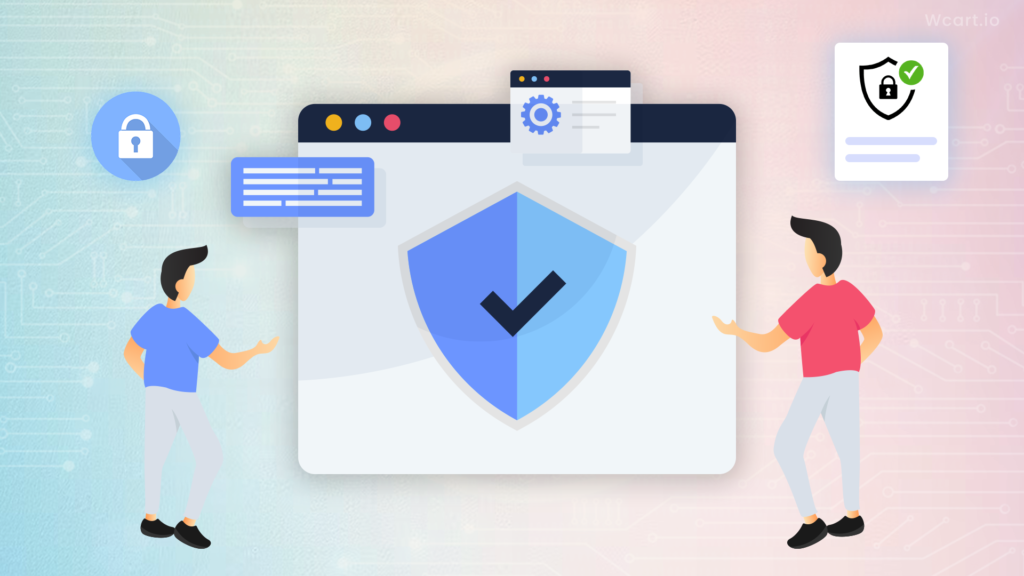
When it comes to e-commerce development, ensuring security is of utmost importance. These platforms handle sensitive user information, such as personal data and financial details. To achieve robust security, here are some vital considerations to keep in mind:
- Embrace secure coding practices: Developers must adopt secure coding practices that effectively address vulnerabilities and minimize the risk of security breaches. This involves employing encryption techniques, validating user input, and steering clear of common pitfalls like SQL injection attacks.
- Implement SSL/TLS encryption: SSL/TLS encryption is crucial for safeguarding sensitive data transmitted between users’ browsers and web servers. It is imperative to employ HTTPS for all pages that collect user data and configure servers to utilize the latest encryption protocols.
- Integrate reliable payment gateways: Integration with secure payment gateways that comply with industry security standards, such as PCI DSS, is essential. This includes employing tokenization to securely store credit card data and implementing fraud detection measures to prevent fraudulent transactions.
- Conduct regular security audits: Regular security audits are vital to identify potential vulnerabilities and promptly implement necessary patches. This involves utilizing automated tools to scan for vulnerabilities and performing manual codebase reviews.
- Employ user authentication and access control measures: Robust user authentication and access control measures are critical to thwart unauthorized access to user data. Strong password policies, multi-factor authentication, and restricted access to sensitive information for authorized personnel are essential components.
Overall, e-commerce developers must prioritize security by implementing secure coding practices, SSL/TLS encryption, reliable payment gateways, regular security audits, and robust user authentication and access control measures. These steps ensure the protection of e-commerce platforms and the sensitive data they handle.
4. Mobile Development
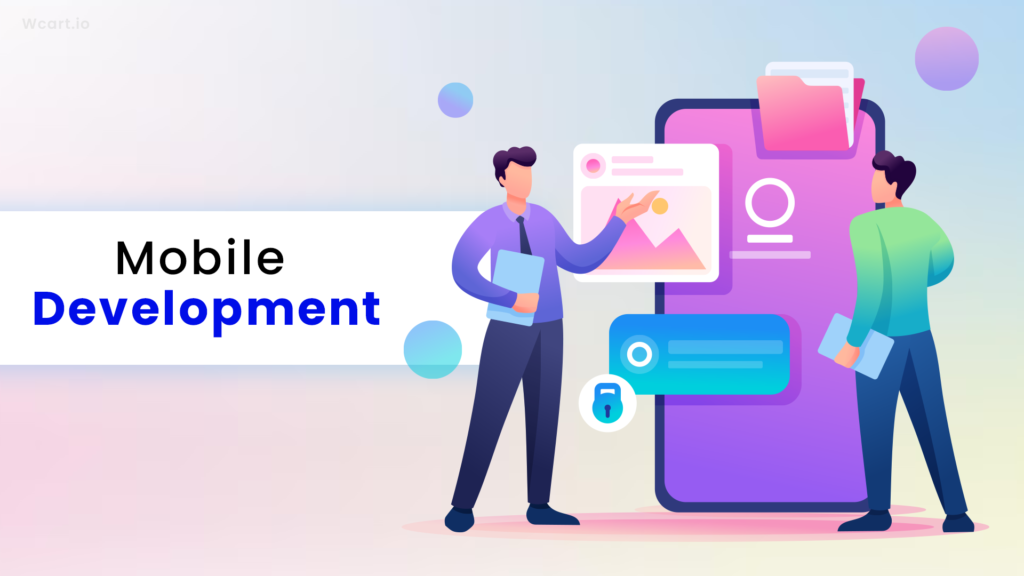
Mobile development plays a pivotal role in the realm of e-commerce development, given that over half of all e-commerce, traffic stems from mobile devices. Below are some vital factors to consider when it comes to mobile development in the context of e-commerce:
- Native vs. cross-platform development: One must deliberate between native and cross-platform development based on business requirements and user experience expectations. Native development offers superior performance and better integration with device features, while cross-platform development enables faster deployment and simpler maintenance.
- User interface design: Crafting mobile interfaces that are tailored to small screens and touch-based interactions is essential. This entails employing large, distinct buttons, minimizing clutter, and ensuring a seamless user experience across various mobile devices.
- Performance optimization: It is imperative to optimize mobile applications to enhance load times and augment user experience. Optimization techniques encompass image optimization, file compression, and minimizing the number of HTTP requests.
- Push notifications: Implementing push notifications is crucial for keeping users engaged and informed about new products, promotions, and other pertinent updates. Personalized messages and targeted notifications based on user segments can be utilized to maximize effectiveness.
- Mobile analytics: Utilizing mobile analytics enables the tracking of user behavior and facilitates the optimization of the mobile experience. This involves monitoring app usage, tracking user engagement, and employing A/B testing to refine the user interface.
Developers must make choices between native and cross-platform development, design mobile interfaces optimized for small screens, optimize performance, implement push notifications, and leverage mobile analytics to track user behavior and enhance the mobile experience.
5. UX/UI Design

UX/UI design plays a vital role in the development of e-commerce platforms, exerting a direct influence on user experience, conversion rates, and customer loyalty. To ensure an engaging and captivating user journey, several key factors must be considered:
- Delve into user research: Embark on comprehensive user research to comprehend the needs and preferences of the target audience. Unveil insights by crafting user personas, conducting surveys and focus groups, and analyzing user behavior data.
- Craft an intuitive information architecture: Forge is a user-friendly and logical information architecture that facilitates effortless navigation. Streamline the browsing experience by organizing products into meaningful categories, implementing clear and consistent terminology, and providing well-defined navigation paths.
- Embrace captivating visual design: Infuse the interface with visually stunning elements that authentically reflect the brand’s personality and values. Leverage the power of color, typography, and imagery to create a harmonious and visually cohesive identity.
- Optimize for mobile devices: Cater to the ever-growing mobile audience by optimizing the user experience for smaller screens. Tailor interfaces to fit these dimensions, integrate touch-friendly controls, and minimize loading times to accommodate the predominant influx of mobile e-commerce traffic.
- Test and optimize relentlessly: Continuously refine the user experience through rigorous usability testing. Identify and rectify pain points by employing A/B testing methodologies, gathering invaluable user feedback, and leveraging analytics to track user behavior and uncover areas for enhancement.
Finally by conducting thorough user research, constructing an intuitive information architecture, implementing visually captivating designs, optimizing for mobile devices, and pursuing ongoing testing and optimization, developers can secure a seamless and immersive user experience.
Explore More: Key Elements of Ecommerce Websites Design
Final Thought about E-commerce Developers
E-commerce, an ever-expanding industry, thrives on the expertise of adept developers who construct and sustain seamless online platforms, catering to the user’s every need. These developers are well-versed i.e. programming languages, responsive web design, security, mobile development, and the intricate art of UX/UI design. Their mission? To fashion visually captivating and fully functional e-commerce havens. In an era dominated by online shopping and the ubiquity of mobile devices, the demand for these skilled artisans will inevitably surge. Their mastery over these vital skills shall catapult them into the vanguard, reshaping the very essence of commerce itself.
Frequently Asked Questions(FAQs)
What programming languages are commonly used by e-commerce developers?
They often use programming languages such as JavaScript, Python, Ruby, and PHP for web development. JavaScript is commonly used for front-end development, while Python, Ruby, and PHP are popular choices for back-end development.
What are some essential skills for e-commerce developers?
Essential skills for e-commerce developers include proficiency in programming languages (such as JavaScript, Python, or PHP), knowledge of web development frameworks (like React or Angular), experience with databases (such as MySQL or MongoDB), understanding of secure coding practices, and familiarity with e-commerce platforms or frameworks (such as Wcart ).
How can I ensure the security of an e-commerce website?
To ensure the security of an e-commerce website, developers should follow best practices such as implementing secure coding techniques, using HTTPS for secure communication, regularly updating software and plugins, implementing strong authentication mechanisms, securely storing and encrypting sensitive customer data, and conducting regular security audits and penetration testing.
What are some popular e-commerce platforms or frameworks?
Some popular e-commerce platforms or frameworks used by developers e.g. Wcart, Webnexs, Shopify, WooCommerce (built on WordPress), and Magento. However, these platforms provide various features and customization options to create and manage online stores efficiently.
How can I optimize the performance of an e-commerce website?
To optimize the performance of an e-commerce website, developers can employ techniques i.e. optimizing images and media files, minimizing HTTP requests, enabling caching, using a content delivery network (CDN), optimizing database queries, implementing lazy loading, and optimizing code and scripts. Hence by Regular monitoring and performance testing can help identify bottlenecks and areas for improvement.
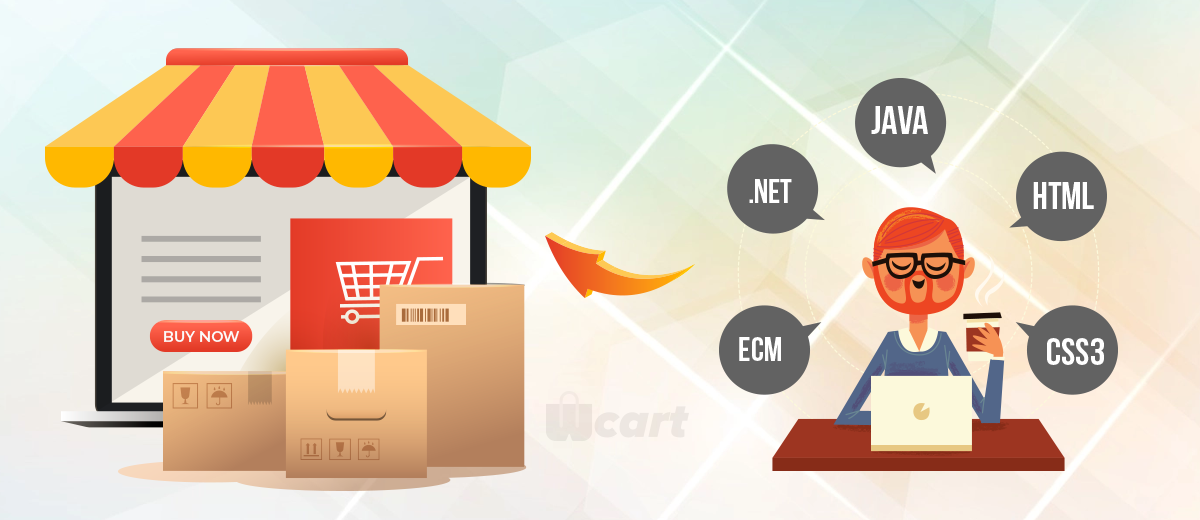



Leave a Reply